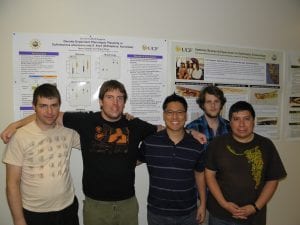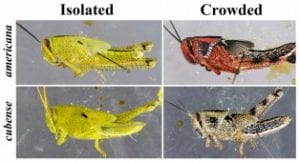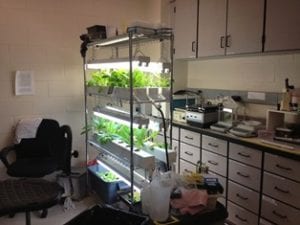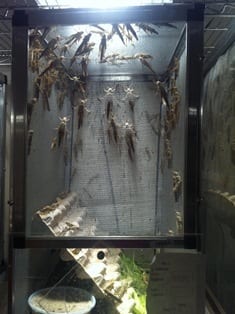Dr. Hojun Song Awarded NSF Grant for Outstanding Research
 While most children grow up wanting to be doctors, astronauts or firefighters, Dr. Hojun Song knew he wanted to study bugs. Song is an assistant professor in the biology department and also the founder of the Song Laboratory of Insect Systematics and Evolution at UCF. It was when he moved to the United States from Korea at the age of 17 that he realized he wanted to study grasshoppers. He explained, “I saw a picture of locusts swarming in the sky and it stuck with me. From then on I knew I wanted to study grasshoppers.”
While most children grow up wanting to be doctors, astronauts or firefighters, Dr. Hojun Song knew he wanted to study bugs. Song is an assistant professor in the biology department and also the founder of the Song Laboratory of Insect Systematics and Evolution at UCF. It was when he moved to the United States from Korea at the age of 17 that he realized he wanted to study grasshoppers. He explained, “I saw a picture of locusts swarming in the sky and it stuck with me. From then on I knew I wanted to study grasshoppers.”
Song is an entomologist whose lab is one of the very few in North America that focuses on the insect order Orthoptera, which includes grasshoppers, crickets, and katydids. He took on the challenge of beginning his own lab because the field of taxonomy and systematics requires expertise, someone who has authority and passes on their knowledge. According to Song, there are not enough experts who specialize on grasshoppers and he feels there is a need for more people with this knowledge.
When he was working through his undergraduate and graduate degrees, Song didn’t have a mentor who was an expert to assist him in his pursuit in the study of grasshoppers. Much of what he knows is self-taught because those who were once experts in the field had already retired and were no longer accepting students. Because of this, he takes pride in knowing that one day the students who work in his lab will become the scientists and leaders of the field who will eventually pass on their knowledge to the next generation. He said, “The most rewarding experience is when I see my student’s progress and begin thinking like a scientist.”
Song’s other motivation is the relevance of his research. It is important to try and understand why some grasshoppers change into locusts and swarm. Locusts are causing millions of dollars in damage to crops leaving nothing to eat and are a major factor as to why many countries in Africa, South America, Asia and Australia suffer. Many try to get rid of the insects with pesticides, but chemical pesticides have drawbacks to the environment. If his research could understand the reasoning behind these changing grasshoppers then maybe one day there will be a way to prevent such swarms.
Song is very dedicated to his work. He explained,” For hobbies I play guitar and cook. However, I consider my main hobby to be my work. There isn’t really a boundary for me between work and hobbies. I am always thinking of the next big thing.”
His passion and innovation has not gone unrecognized. Song was recently awarded the National Science Foundation CAREER Award titled “CAREER: Evolution of Locust Swarms and Phenotypic Plasticity in Grasshoppers,” for $787,000 to support his research on understanding the evolution of locust swarms. Songs research will work to understand why the swarming phenomenon has evolved, why locusts swarm and what makes them different from typical grasshoppers.
For a link to Dr. Song’s lab website, click here
To learn more about Dr. Song’s research, click here.





